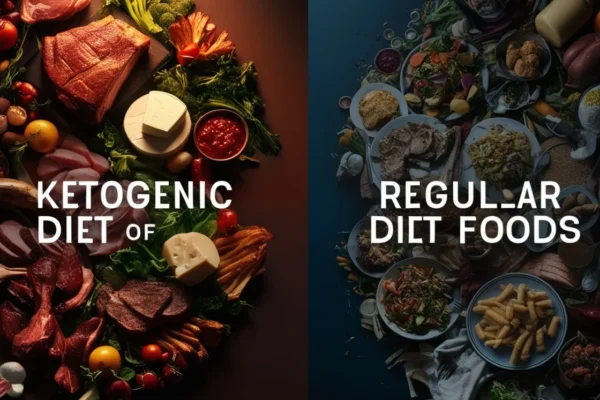Introduction to the Keto Diet
The ketogenic diet, commonly referred to as the keto diet, is a low-carbohydrate, high-fat dietary approach that has gained significant popularity in recent years. This diet aims to induce a state of ketosis in which the body primarily utilizes fat for energy rather than carbohydrates. By drastically reducing carbohydrate intake and replacing it with fats, the body shifts its metabolism, encouraging the production of ketones, which serve as an alternative fuel source. This fundamental principle distinguishes the keto diet from other common dietary regimens such as low-fat or balanced diets, which often maintain higher levels of carbohydrate consumption.
The typical macronutrient distribution of the ketogenic diet consists of approximately 70-75% fats, 20-25% protein, and only about 5-10% carbohydrates. Such a significant reduction of carbs compels the body to search for other energy sources, making fats the primary component of daily caloric intake. This high-fat, low-carb formula not only assists in weight loss for many adherents but also helps in controlling blood sugar levels, enhancing mental clarity, and improving overall energy levels throughout the day.
Given its unique metabolic approach, the keto diet necessitates a careful selection of foods, especially in the morning. Breakfast becomes a crucial meal that should support the body’s transition into ketosis. Consuming a suitable keto breakfast allows individuals to remain aligned with their dietary goals, providing sufficient energy while avoiding the quick spikes in blood sugar commonly associated with high-carb breakfasts. Emphasizing foods rich in healthy fats and low in carbohydrates is essential to start the day off on the right foot, setting the stage for effective weight management and sustained energy levels.
Why Breakfast Matters
The significance of breakfast cannot be overstated, particularly for individuals adhering to a ketogenic lifestyle. As the first meal of the day, breakfast serves as a critical opportunity to kickstart metabolism, replenishing depleted energy stores after an overnight fast. This early nutrition profoundly impacts both physical and mental performance throughout the day.
A well-balanced breakfast is essential not only for regulating energy levels but also for enhancing mood and concentration. Consuming nutrient-dense foods in the morning can lead to improved cognitive functions, making it easier to focus and remain productive. When one is following a ketogenic diet, incorporating high-quality fats, moderate protein, and low carbohydrates in breakfast can help maintain stable blood sugar levels, thus preventing the energy crashes that often accompany a carb-heavy meal.
Moreover, a nutritious breakfast can set the tone for one’s food choices throughout the day. By starting the day with a wholesome, keto-friendly meal, individuals are less likely to crave unhealthy snacks and more inclined to make better dietary decisions subsequently. This is particularly relevant when considering the psychological aspect of eating. A satisfying breakfast can mitigate feelings of hunger and cravings, further supporting adherence to a ketogenic lifestyle.
In conclusion, the importance of breakfast is amplified in the context of a keto diet. It plays a pivotal role in sustaining energy levels, enhancing mental clarity, and promoting a stable mood. As such, making an effort to include a nutritious breakfast can significantly influence overall well-being and productivity throughout the day. Individuals on a ketogenic diet should prioritize this meal to harness its potential benefits for a healthier lifestyle.
Key Nutritional Components of a Keto Breakfast
A ketogenic diet emphasizes a high intake of healthy fats, moderate protein consumption, and minimal carbohydrates. Understanding the essential nutrients that comprise a keto breakfast is vital for achieving and maintaining the desired state of ketosis. The primary macronutrients in a keto meal are healthy fats, proteins, and low-carbohydrate options, each playing a crucial role in energy levels and fullness throughout the day.
Healthy fats, which should account for the majority of calorie intake in a keto breakfast, provide the body with a dense energy source while promoting satiety. Sources such as avocados, nuts, seeds, and coconut oil are ideal for enhancing nutritional value. These fats are not only beneficial for energy but also support cellular function and hormone production, assisting in overall health. Furthermore, omega-3 fatty acids found in foods like flaxseeds and fatty fish play a crucial role in cardiovascular health and reducing inflammation.
Adequate protein is also important in a keto breakfast to help preserve muscle mass while the body adapts to burning fat for energy. Protein sources such as eggs, dairy, and meat offer high-quality amino acids essential for various bodily functions. This macronutrient contributes to feelings of fullness, which can help regulate appetite and prevent overeating. Additionally, the digestive process of protein can lead to a more sustained release of energy compared to carbohydrates.
Finally, choosing low-carbohydrate options, including leafy greens and non-starchy vegetables, can enhance the nutritional profile of a keto meal. These foods are rich in vitamins and minerals like potassium, magnesium, and vitamins A, C, and K, which support metabolic health and overall bodily functions. By integrating these key nutritional components into a keto breakfast, individuals can ensure they receive the necessary support for energy levels and well-being, setting a solid foundation for their day.
Quick and Easy Keto Breakfast Recipes
Starting your day with a nutritious breakfast can be both simple and satisfying, even on a keto diet. Below are a few quick keto breakfast recipes that are not only easy to prepare but also packed with flavor and essential nutrients. These recipes prioritize low-carb ingredients while providing ample protein to keep you energized throughout the morning.
1. Keto Smoothie: Combine one cup of unsweetened almond milk, half an avocado, a handful of spinach, and a tablespoon of chia seeds in a blender. Blend until smooth, and you can optionally add a scoop of protein powder for an extra boost. This green smoothie is rich in healthy fats and fiber, making it an excellent choice for a keto breakfast.
2. Scrambled Eggs with Spinach and Feta: Whisk together two large eggs in a bowl and season with salt and pepper. In a non-stick skillet, heat a teaspoon of olive oil over medium heat, then add a handful of fresh spinach. Sauté until wilted, then pour in the eggs and cook, stirring gently. Once the eggs start to set, sprinkle in some crumbled feta cheese and cook until the eggs are cooked through. This dish offers protein, healthy fats, and micronutrients.
3. Low-Carb Pancakes: For a delightful breakfast treat, mix one cup of almond flour with two eggs, a quarter cup of unsweetened almond milk, and a teaspoon of baking powder. Heat a non-stick skillet over medium heat and pour in small amounts of batter to form pancakes. Cook until golden brown on each side. Serve with a dollop of Greek yogurt and fresh berries for a delicious yet keto-friendly meal.
These quick keto breakfast recipes highlight the ease of integrating nutritional meals into your busy mornings. Incorporating a variety of ingredients ensures that you not only enjoy your breakfast but also maintain your low-carb lifestyle effectively.
Meal Prep Ideas for Keto Breakfasts
Meal prepping has gained substantial popularity, especially among those following a ketogenic diet. The ketogenic lifestyle revolves around low-carb, high-fat meals, making preparation essential for maintaining dietary goals while managing time effectively. By planning and preparing keto breakfasts in advance, individuals can not only ensure they remain committed to their nutritional objectives but also enjoy diverse and satisfying meals throughout the week.
To begin meal prepping for keto breakfasts, it is crucial to create a comprehensive plan that outlines the meals for the week. Consider incorporating a variety of textures and flavors to prevent monotony. Common keto breakfast staples include eggs, avocados, cheese, and low-carb vegetables. You can prepare items like scrambled eggs with spinach and feta, or create mini frittatas baked in muffin tins for easy portion control.
Another effective strategy is batch cooking. For example, making a large quantity of zucchini bread or almond flour pancakes can be an excellent way to have a quick breakfast option on hand. These can be easily frozen and reheated in the mornings, offering convenience without sacrificing dietary principles. Additionally, preparing overnight chia seed puddings or keto-friendly smoothies can also provide nutritious options that are ready to go right from the fridge.
Incorporating various toppings and accompaniments can further diversify breakfast options. Consider preparing fresh berries, yogurt alternatives, or nuts that can be added to dishes as desired. Furthermore, utilizing meal prep containers can help in organizing different meal components, ensuring that everything necessary for a fulfilling keto breakfast is easily accessible throughout the week.
Through organized meal prepping, individuals following a keto diet can enhance their breakfast routine while streamlining the process of maintaining a healthy lifestyle. Planning and execution are key to enjoying delicious low-carb breakfasts that not only meet nutritional targets but also provide satisfaction and variety.
Staying Satisfied: Managing Hunger on Keto
One of the primary advantages of a ketogenic diet is its ability to manage hunger effectively. A well-planned keto breakfast is essential for promoting satiety and ensuring that you remain energized throughout the day. By emphasizing high-fat, low-carb breakfast options, individuals can achieve a stable energy release, thus minimizing the urge to snack before the next meal. This approach not only aligns with the principles of ketosis but also supports metabolic efficiency.
High-fat breakfast foods such as avocados, eggs, nuts, and seeds are integral to a keto diet. These options are nutrient-dense and provide healthy fats that can keep individuals feeling full longer. For example, incorporating avocados into a morning omelet or a smoothie can enhance both flavor and nutritional content while sustaining satiety. Eggs, rich in protein and fat, can serve as a foundation for creating varied breakfast dishes, from simple scrambled eggs to elaborate frittatas packed with keto-friendly vegetables.
To avoid the temptation of unscheduled snacking, it is essential to balance meals thoughtfully. Consuming adequate portions of high-quality fats and proteins not only curbs hunger but also ensures a gradual release of energy throughout the day. For instance, pairing a serving of full-fat yogurt with chia seeds and berries can create a delicious breakfast that is satisfying without being overly calorie-dense. Additionally, incorporating fiber-rich foods, such as leafy greens or nuts, can further promote feelings of fullness.
Maintaining this balance in a keto breakfast can lead to sustained energy levels and reduced cravings, ultimately contributing to a more manageable and enjoyable experience on a ketogenic journey. In conclusion, a strategic approach to breakfast on a keto diet not only helps manage hunger but also supports overall health and well-being.
Common Mistakes in Keto Breakfast Choices
Embarking on a ketogenic diet often presents individuals with a range of choices, particularly when it comes to breakfast. However, it is easy to fall into common traps that can undermine the intended benefits of this low-carb lifestyle. One major pitfall is selecting high-carb alternatives, such as sugary cereals, toast, or pancakes, which can significantly impede the state of ketosis and disrupt metabolic processes. To maintain a ketogenic state, breakfast options should primarily focus on healthy fats and a moderate amount of protein, limiting carbohydrates to a minimum.
Another frequent mistake involves neglecting nutrient diversity. While it may be tempting to rely on a narrow set of ketogenic staples, such as bacon and eggs, doing so can lead to a lack of essential vitamins and minerals. To optimize health on a keto diet, it is important to incorporate a range of nutrient-dense foods, including leafy greens, avocados, nuts, and seeds. These foods not only provide vital nutrients but can also enhance satiety and flavor, making breakfast more enjoyable and sustainable.
Furthermore, many individuals may inadvertently consume processed keto products, assuming they are inherently healthy due to their low carb content. Many of these products can be high in unhealthy additives, preservatives, or poor-quality fats. Instead, focusing on whole, unprocessed foods is crucial for achieving better overall health while adhering to a keto diet. Reading labels and selecting fresh ingredients can go a long way in avoiding unhealthy choices.
In summary, avoiding common mistakes in keto breakfast choices can significantly enhance the effectiveness of a ketogenic lifestyle. By steering clear of high-carb options, ensuring nutrient diversity, and choosing whole foods over processed alternatives, individuals can make smarter breakfast decisions that align with their health goals.
Incorporating Variety in Your Keto Breakfasts
Incorporating variety into your keto breakfasts is essential for sustaining interest in this low-carbohydrate diet over the long term. When embarking upon a ketogenic journey, many individuals may initially gravitate towards familiar dishes such as scrambled eggs and bacon. However, sustaining enjoyment through diverse flavors, ingredients, and textures can help prevent breakfast monotony, making adherence to the ketogenic lifestyle more enjoyable and manageable.
One effective strategy for achieving diversity is to explore different protein sources. While eggs are a staple in many keto diets, incorporating ingredients such as cottage cheese, Greek yogurt, or chia seeds can offer unique tastes and textures.
Each of these options provides a wealth of nutritional benefits and can be paired with various toppings, such as nuts or berries, to amplify flavor while remaining keto-friendly. Experimenting with different cooking methods—like poaching, baking, or frittatas—can further diversify your morning routine.
Another avenue to introduce variety is by utilizing vegetables in your breakfast meals. Vegetables such as spinach, bell peppers, and avocados not only complement traditional breakfast proteins but also provide essential vitamins, minerals, and fiber without significantly raising carbohydrate counts. Consider preparing an omelette loaded with a medley of vegetables for a hearty breakfast that is both colorful and nutritious.
Additionally, embracing different cuisines can elevate your breakfast experience. For instance, incorporating spices and flavors from Mediterranean or Asian cuisines adds an exciting twist to familiar dishes. A breakfast bowl featuring riced cauliflower, avocado, and a sprinkle of sesame seeds can provide a refreshing change that aligns well with keto principles.
Ultimately, the key to maintaining long-term adherence to a keto diet lies in the exploration of variety. By making small adjustments and embracing different ingredients and culinary influences, individuals can enjoy satisfying and innovative breakfasts that cater to their taste while supporting their ketogenic lifestyle.
Conclusion: Embracing Keto Breakfasts for a Healthier Lifestyle
In recent years, the popularity of the ketogenic diet has surged, leading many individuals to reconsider their breakfast options. A keto breakfast offers a unique opportunity to enjoy a meal rich in healthy fats and low in carbohydrates, promoting sustained energy and mental clarity throughout the morning. This approach not only supports weight management but also contributes positively to overall health.
Throughout this blog post, we have explored various aspects of keto breakfasts, including the nutritional benefits and the versatility of ingredients that can be incorporated into meals. By utilizing foods such as eggs, avocados, and nuts, individuals can craft satisfying dishes that align with their health goals. Recipes such as keto pancakes or egg muffins demonstrate that a low-carb breakfast can be both delicious and enjoyable, dispelling the myth that healthy eating lacks flavor.
Moreover, adopting a keto breakfast routine encourages mindful eating habits, allowing individuals to appreciate the quality of their food choices rather than merely focusing on calorie counts. This mindfulness can lead to a more sustainable lifestyle, where dietary changes become a natural part of one’s daily routine rather than a fleeting phase.
As you consider your own breakfast choices, may these insights inspire you to embrace the idea of incorporating keto-friendly meals into your mornings. The transition to a ketogenic approach can be both rewarding and simple, as it opens a world of culinary possibilities that satisfy cravings without compromising health objectives. By making these changes, you can kickstart your day with nutrition that fuels both body and mind, setting a positive tone for the hours ahead.






